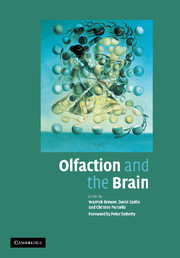Book contents
- Frontmatter
- Contents
- Foreword
- Preface
- List of Contributors
- Section I Neurology, Neurophysiology and Neuropsychology: Olfactory Clues to Brain Development and Disorder
- 1 Structure and Function of the Olfactory System
- 2 Olfaction and the Temporal Lobes
- 3 Role of the Insula in Smell and Disgust
- 4 Olfaction and Memory
- 5 Olfactory Neurogenesis: A Window on Brain Development
- 6 Olfactory Processing and Brain Maturation
- 7 Probes of Behaviour Regulation: Olfactory Models in Addiction
- Section II Social Functioning: Role of Evolution, Genetics and Gender
- Section III Assessment and Disorders of Olfaction
- Index
- Plate section
- References
5 - Olfactory Neurogenesis: A Window on Brain Development
from Section I - Neurology, Neurophysiology and Neuropsychology: Olfactory Clues to Brain Development and Disorder
Published online by Cambridge University Press: 17 August 2009
- Frontmatter
- Contents
- Foreword
- Preface
- List of Contributors
- Section I Neurology, Neurophysiology and Neuropsychology: Olfactory Clues to Brain Development and Disorder
- 1 Structure and Function of the Olfactory System
- 2 Olfaction and the Temporal Lobes
- 3 Role of the Insula in Smell and Disgust
- 4 Olfaction and Memory
- 5 Olfactory Neurogenesis: A Window on Brain Development
- 6 Olfactory Processing and Brain Maturation
- 7 Probes of Behaviour Regulation: Olfactory Models in Addiction
- Section II Social Functioning: Role of Evolution, Genetics and Gender
- Section III Assessment and Disorders of Olfaction
- Index
- Plate section
- References
Summary
Introduction
It is understandable that members of the public are surprised to learn that a biopsy taken from inside the nose may be able to provide clues into neurological and psychiatric disorders. Those with the knowledge of the development of Freudian psychoanalysis may have a particular shudder of recognition at any project that links psychiatry with surgical procedures on the nose. Wilhelm Fliess (1858–1928) was a Berlin-based Ear, Nose and Throat specialist (oto-rhino-laryngologist), who was preoccupied with the influence of biological rhythms on health and disease. He also developed a bizarre theory linking the erectile tissue in the nose with sexuality. Sigmund Freud, the father of psychoanalysis, corresponded with Fliess over many years. They shared a belief that surgery on the nose could interrupt ‘reflex nasal neuroses’, and thus be an effective treatment for various neurotic disorders thought to be connected to sexuality. The details of this theory do not warrant further scrutiny apart from one incidence that became pivotal in the development of psychoanalysis. Freud had sent one of his most celebrated patients (Emma Eckstein) to Fliess for the nasal surgery as a treatment for her ‘psychological’ condition. In an act of gross negligence, Fleiss left a nasal pack in situ after the surgery and did not provide appropriate follow-up or after-care. After much suffering, another surgeon discovered the mistake, and the nasal pack was removed.
Keywords
Information
- Type
- Chapter
- Information
- Olfaction and the Brain , pp. 83 - 102Publisher: Cambridge University PressPrint publication year: 2006
